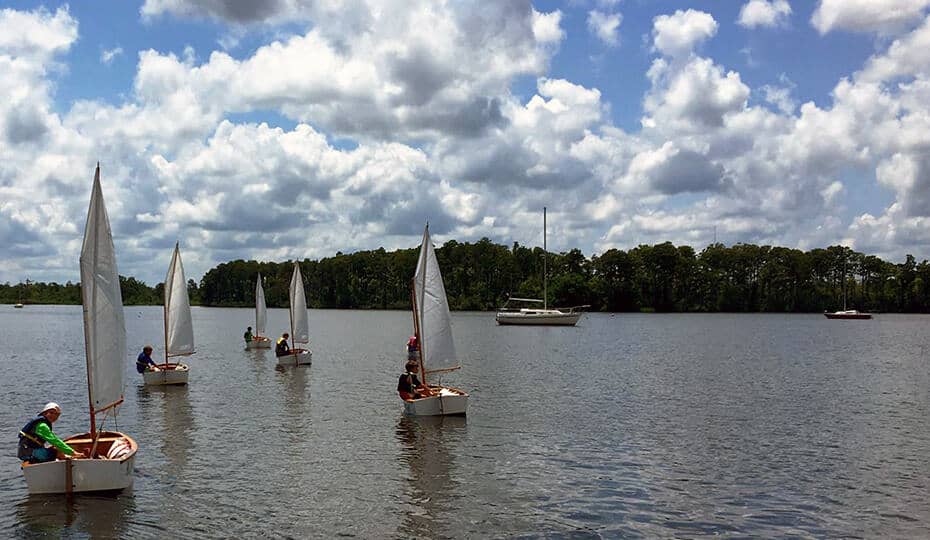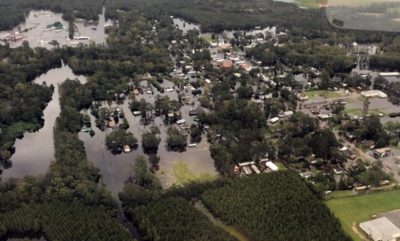
For 10 weeks this summer, when a fleet of small boats sails off from Washington, North Carolina, into the Pamlico River, the intrepid young skippers will be on the lookout not only for the telltale signs of a wind shift but also for pieces of trash littering the waterway.
At Little Washington Sailing School, students learn life lessons as they learn to sail.
“What we tell our kids every week is: ‘This is our highway, this is our resource as Americans, and we all need to take care of it,’” said director Kevin Clancy. “They learn so much out here, other than how to get the boat from A to B. They learn about the environment, about weather, teamwork and problem-solving on the go.”
This summer, for the first time, the school is offering an advanced course that integrates STEM into its instruction. “Science, technology, engineering, math — so many of those factors come into play with sailing,” Clancy said. “You have wind directions, apparent wind direction and actual wind direction. You have to compute those two to figure out their course.”
Students will fashion anemometers out of paper cups to measure wind speed. They’ll study water quality. They’ll even use the Pythagorean theorem to calculate the size of a sail.
Clancy said the school, which was founded 11 years ago, measures success by the number of children enrolled and the number of scholarships awarded. He’s expecting more than 150 sailors this year — with 20 scholarships funded by Duke Energy’s Water Resources Fund.
“Beaufort County is a Tier 1 community, a designation of economic distress in our state,” said Cheryl McGuire, a board member of the sailing school. “Students don’t have many STEM education opportunities, and although the town does a great job of supporting the school, it is still difficult to find resources. That is why we are so grateful to everyone who helped us get this grant from Duke’s Water Resources Fund for scholarships and a new safety boat.”
The nonprofit sailing school is one of 12 organizations in the Carolinas that received a total of $940,000 in grants this year from the Water Resources Fund, which was designed to improve water quality, promote fish and wildlife habitat and increase public access.
The sailing school also used part of its $32,512 to repair docks and provide training for instructors. One aspect of the school that appealed to the panel making the grant selections is its emphasis on helping young people understand their role in protecting the environment.
“By investing in these young people, we’re creating the next generation of environmental stewards who are going to care for North Carolina’s waterways,” said Amy Strecker, stakeholder philanthropy manager for Duke Energy Foundation. “It really takes all of our society engaging in the protection of our waterways for the work to be successful. To help expose kids who might not otherwise have had waterways opportunities is really valuable.”
Every week, the school has a “trash war.” The student who picks up the most trash floating in the river receives a $5 gift certificate for ice cream.
“They have to sail to the piece of trash,” Clancy said. “It’s a motivation and a destination. We have pulled out between 100 and 200 pounds of junk out of this river — everything from a bottle cap to a tire.”
Morgan Watkins learned to sail at the camp when she was 12 and loved it so much she returned for the entire summer the next two years and then began helping with instruction. She’s now a rising senior at East Carolina University, majoring in engineering, and still working at Little Washington Sailing School.
“The kids are learning independence,” Watkins said, “how to think for themselves. Sometimes I try to get them to do upwind sailing before I teach them how to do upwind sailing to see if they can figure it out and work through it on their own. Then when I teach it, they have a better understanding of how it works.
“We’ll have kids come in absolutely terrified the first day, their heads down, screaming in the boat, doing spirals. By the end of the week, they’re sailing upwind, smiling the whole way.”
And racing each other to pick up the most trash.
This article was first published in Duke Energy’s illumination publication. Duke Energy Foundation supports the work of EducationNC.
Recommended reading


